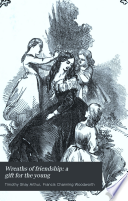 | Edward Mangin - Authors, English - 1841 - 234 pages
...but in the published poems of Sir John Mennes, a clerk in the Admiralty, in the time of Charles II. " He who fights and runs away, May live to fight another day," &c. This may be an instance of accidental resemblance in Mennes and Butler: such petty larceny as has... | |
 | Edward Mangin - Authors, English - 1841 - 194 pages
...but in the published poems of Sir John Mennes, a clerk in the Admiralty, in the time of Charles II. " He who fights and runs away, May live to fight another day," &c. This may be an instance of accidental resemblance in Mennes and Butler: such petty larceny as has... | |
 | Willson Cryer - 1842 - 60 pages
...reprehensible cowardice. Discretion is the better part of valour ; for in the language of Hudibras, — " He who fights and runs away, May live to fight another day ; But he that is in battle slain Will never rise to fight again." Dr. Mc'Intosh, a late lecturer on... | |
 | James Carter, Thomas Carter - Biography & Autobiography - 1845 - 486 pages
...My opinion, however, is, that upon the subject of fighting he held the doctrine which teaches that " He who fights, and runs away, May live to fight another day ; While he who is in battle slain Can never rise to fight again." Yet he might, had he been tried,... | |
 | 1846 - 742 pages
...which consists in a very high degree of discretion, suggesting to its possessor, not merely that, " he who fights and runs away, may live to fight another day ;" bnt that he who runs away without fighting, has a better chance of coming to a future conflict unmaimed... | |
 | Industrial arts - 1846 - 544 pages
...the better part of valour," and wholly free from any silly disregard for the memorable adage that " He who fights, and runs away, May live to fight another day.*' Yes, these were the essential but difficult lessons required to be taught the Woolwich youth — these... | |
 | 1847 - 556 pages
...happy for the world that neither of them had too much mauvaite honte to act on the maxim, that — " He who fights and runs away, May live to fight another day." If his epicurean habits should he urged, it must he remembered that he was a pagan ; that it was the... | |
 | Electronic journals - 1858 - 682 pages
...French force. I give the yea d" esprit from memory : — " Two warriors said, and who'll gainsay, That he who fights and runs away May live to fight another day. But gallant MURHAY doth surpass That valiant hero Hudibrax ; For Sir John holds, that it is right To... | |
 | Timothy Shay Arthur, Francis Channing Woodworth - Friendship - 1849 - 252 pages
...were dead, he could be of no service whatever to the world. Hudibras said well when he said, " That he who fights and runs away, May live to fight another day." That was good logic. But Carlo went farther than this, even. He was for running away before he fought... | |
 | Samuel Roffey Maitland - Reformation - 1849 - 634 pages
...which consists in a very high degree of discretion, suggesting to its possessor, not merely that, " he who fights and runs away, may live to fight another day ;" but that he who runs away without fighting, has a better chance of coming H to a future conflict... | |
| |